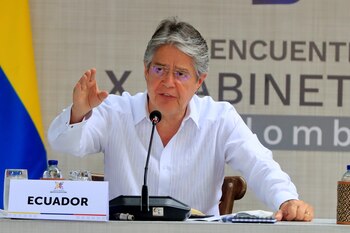
President Guillermo Lasso partially amended the bill on abortion in case of rape in Ecuador. It did so through the constitutional mechanism of the partial veto of the bill recently passed by the National Assembly. In the text of the veto, President Lasso detailed 61 comments on the drafting of the law and has provided new texts, as authorized by the Ecuadorian Constitution. The partial presidential objection, in the broad sense, means that the President of the Republic is entitled to propose changes to a legal text approved by the National Assembly.
President Guillermo Lasso announced his decision not to contravene the law on this matter, approved by the National Assembly and that it would be debated as a provision of the Constitution Court after the court decriminalized abortion for rape. However, the partial veto does not mean that abortion will be criminalized again under criminal law, but that other time-limit specifications are proposed, for example.
After this presidential decision, the vetoed law will be returned to the National Assembly for legislators to decide within 30 days whether to accept the comments introduced by the president or whether they are ratified in the original text that was approved.
The original text provided that abortions due to rape in Ecuador could be performed up to 12 weeks, with the exception of girls, adolescents and women from rural and indigenous areas, because for them the deadline was extended to 18 weeks. The argument used by advocates for the right to decide has been that, among these segments of the women's population, access to sexual health institutions is limited. The response to the presidential objection suggests that the deadline refers to the viability of the fetus and not to the pregnant woman. In this case, the viability of the fetus, as an autonomous organism of its pregnant woman, says the objection, should be the same for all women regardless of age or origin.
Some women's rights voices immediately questioned this presidential position. Sybel Martínez, vice-president of the Council for the Protection of the Rights of Children and Adolescents, and director of School Rescue, responded that President Lasso “co-legislates based on his convictions and beliefs by forcing thousands of pregnant victims of sexual violence to suffer who will not arrive in time. Access to abortion due to rape is again, unsafe, clandestine and a privilege of few!” , he sentenced. María Sol Borja, journalist and political editor, also said that “ignorance is noticeable. Often this representative is precisely the rapist”, referring to the complaint proposed by the president that girls must submit, accompanied by their legal representative, after having suffered sexual assault. María Paz Jervis, a feminist and university dean, said that “in addition to the denunciation, the affidavit, everything costs us twice as much for women.”
President Lasso stated that he has made 61 revisions to the document and that he intends that the bill approved by the legislature is in accordance with the decision of the Constitutional Court.
In his veto, Guillermo Lasso also expresses his personal position as president. In the section he states that he does not agree with the decision of the Court but that, nevertheless, as a representative, he shall respect the decisions taken by the institutions within the framework of his powers, even if he does not agree with them. In the presidential veto, the term for abortion is unified in all cases following the provision of the Court that ordered the maximum period to voluntarily terminate a pregnancy in the event of rape according to scientific, technical and medical criteria, and “not political or axiomatic,” the presidential objection document notes.
He also explained that the Ecuadorian parliament forgot to introduce cases concerning physicians' conscientious objection and therefore sought to submit observations that would guarantee all health professionals to exercise this constitutional guarantee.
The 64-article bill, two general provisions, six transitional provisions, nine reformatory provisions and one final provision was debated by order of the Constitutional Court of Ecuador, which on April 29, 2021 decriminalized abortion in cases of rape. This ruling is a landmark court ruling that was published a few days after the official results that attributed the victory to assume the presidency of conservative Guillermo Lasso, an outspoken anti-abortionist, were proclaimed.
KEEP READING:
Últimas Noticias
Debanhi Escobar: they secured the motel where she was found lifeless in a cistern

The oldest person in the world died at the age of 119

Macabre find in CDMX: they left a body bagged and tied in a taxi
The eagles of America will face Manchester City in a duel of legends. Here are the details

Why is it good to bring dogs out to know the world when they are puppies



